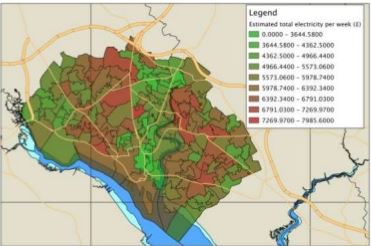 Whilst publicly available data on the spatial variation of existing energy demand has improved significantly in recent years (e.g. DECC Sub-national Energy Consumption Statistics), the focus of analysis is still overwhelmingly at the national or regional level. However, local and regional variation in energy use habits, in perceptions and uptake of low carbon technologies (electric vehicles, heat pumps etc.) and in sustainable behaviours are likely to have significant implications for policy within and across countries.In the absence of improved understanding, the potential spatial variation in consumers’ adoption and acceptance of the wide range of services that smart grid technologies can provide will be a significant unknown factor, undermining the realisation of their potential benefits. Understanding this spatial variation in uptake of, for example, management of energy consumption and demand via dynamic and differentiated tariffs and technologies such as local energy production is therefore crucial to assessing the socio-economic, infrastructural and energy and carbon implications.
Whilst publicly available data on the spatial variation of existing energy demand has improved significantly in recent years (e.g. DECC Sub-national Energy Consumption Statistics), the focus of analysis is still overwhelmingly at the national or regional level. However, local and regional variation in energy use habits, in perceptions and uptake of low carbon technologies (electric vehicles, heat pumps etc.) and in sustainable behaviours are likely to have significant implications for policy within and across countries.In the absence of improved understanding, the potential spatial variation in consumers’ adoption and acceptance of the wide range of services that smart grid technologies can provide will be a significant unknown factor, undermining the realisation of their potential benefits. Understanding this spatial variation in uptake of, for example, management of energy consumption and demand via dynamic and differentiated tariffs and technologies such as local energy production is therefore crucial to assessing the socio-economic, infrastructural and energy and carbon implications.
This workshop, co-hosted by Dr Nazmiye Balta-Ozkan, University of Westminster and Dr Ben Anderson, University of Southampton & DEMAND brought together researchers, policy makers, industry, the public sector and the third sector to share recent results on the spatial implications of the transition to smarter energy delivery and to synthesise the evidence base in support of appropriate public policies and commercial strategies. Ben presented work that combines Census 2001/2011 and energy expenditure survey data using small area estimation methods as a tool for thinking about and modelling the local effects of potential policy or commercial intervention scenarios.
Policy Studies Institute, London: 7 February 2014

